- Home
- Michael Crichton
Easy Go Page 5
Easy Go Read online
Page 5
“You are early.”
Pierce turned to face a man of medium height, chunky and muscular, with a handsome though unshaven face, and eyes as cold and deadly as he had remembered.
“Hello, Pedro.”
“You can call me Nikos now,” Nikos Karagannis said. “I have a taxi outside. Shall we go?”
They drove through the winding streets of the old quarter, past the seraglio and the fringes of the kapali, the vast bazaar. Covering nearly a square mile, Istanbul’s open market was the second largest in the world after Hong Kong. It was a busy, teeming, colorful section of the city; vendors had set up portable displays on the sidewalks, and the stalls sold everything from luxurious brocade and Meerschaum pipes to Gillette razors. The streets were jammed with buyers, the air thick with dust.
Nikos directed the driver to a side alley, and they stopped near the end, entering a narrow, dilapidated house. He led the way up rickety wooden stairs.
“This belongs to a friend,” Nikos explained. “Not here now.”
They came to a hallway, and he opened one door. It was a small room with a small table and unmade bed. A girl sat on the bed, combing her hair.
“I told you to go,” Nikos said.
She looked up, eyes large, mouth pouting. She was a big girl, voluptuous in a tight red dress. Her hair was as black as her eyes and very glossy. “I know,” she said. “You told me.”
Nikos looked at Pierce and sighed. “I try to be a gentleman,” he said. “It was always my wish, as a boy. To be a gentleman.”
Abruptly, his hand flashed out, and he smacked the girl across the face. She gasped, more from the suddenness of the move than the pain.
His face blank, Nikos held the door wide and nodded toward her. She was struggling to control her features and maintain her dignity. She stood, threw her shoulders back, and walked out. Nikos shut the door softly behind her.
“I have only ouzo,” he said, going to the desk and removing a bottle. “Will that do?”
“Yes,” Pierce said.
“You are agreeable today, my friend,” Nikos said, pouring two glasses of the liqueur. “Do you need me very badly?”
“Of course not.”
“Good. You know, I have never killed a man before.” He stared reflectively at his glass. “It rubs me wrong, killing.”
“No killing.”
Nikos sighed. “I am relieved. Great money is always such a temptation; principles often suffer. You are sure no killing?”
“Yes.”
“Then we can talk further.”
Pierce sat down on the bed. “What is your nationality these days?”
“Greek. I have been Greek for the last six months, since my Lebanese passport expired. New passports are so expensive now. I had a good Turkish one, but it was stolen. Can you imagine? Something stolen from me?” He laughed.
Pierce laughed with him. It was really a ludicrous thought, for Nikos Karagannis was a superb thief. He boasted that he could steal anything from anybody, anytime. He had stolen a Ferrari from the Aga Khan, in Rome, to win a twenty-dollar bet. (He had later returned it for a sizable reward.) He had stolen the Golden Lions from the Venice Film festival three years ago. He had stolen four Rembrandts, three Copleys (during a brief visit to Boston), and a Giorgione during his career. He liked his work and was good at it.
He was handsome in a rugged, gruff way. His smile was broad, his manner open, and his mind unfailingly sharp. He was a natural athlete, with quick reflexes and fine coordination.
“I need an Egyptian,” Pierce said.
“Impossible,” Nikos said. “A decent Egyptian passport will cost you a fortune. They are very hard to find and must be well done—the government checks them carefully.”
“No passports, just nationality. Can you pass for an Egyptian do you think?”
“I was born in Alexandria.”
“That was a long time ago. How is your Arabic?”
Nikos snorted. “Better than your English.”
“Could you pass as an Egyptian among other Egyptians?”
“Such trifles.” He lit a cigarette. “Please do not insult me. How much money is involved?”
“For you, five million dollars.”
“How much in total?”
“Fifty million.”
“That is a great deal of money. It is by far the greatest robbery in history. You are ambitious.”
“I suppose.”
“Do not be modest,” Nikos said, waving his hand. “The Americans have always fascinated me. You, for instance—I did not think you were dishonest, my friend.”
“I wasn’t.”
Nikos shrugged. “Naturally. Who was ever dishonest until he saw the opportunity?”
“Are you interested?”
“Do you think I am a fool? Of course I am interested. But let us understand each other well.” The eyes, cold and gray, stared at Pierce. “Among ourselves, we will be honest.”
“Of course.”
“Do not say ‘of course.’ Say, ‘yes.’”
“Yes.”
From nowhere, the knife appeared and whished across the room to stick in the door, quivering. It happened with a speed that Pierce could not believe.
“No games?” Nikos asked.
“No games,” Pierce said, his eyes on the knife.
“Good.”
8. Athens
IT WAS RAINING IN Athens. Pierce could hear the drops spattering on the window of his hotel room. Distant thunder rumbled softly, and there was a flicker of lightning. He stopped to shake a cigarette out of a packet, then stopped and put it back. He had been smoking too much lately; his mouth was raw, his tongue numb. The constant traveling, the tension, the drinking had left him feeling uncertain and depressed.
Only a week ago, he had been a bored freelance writer sitting in a Cairo bar. His biggest problem was whether or not to spend the evening drinking or chasing women.
And now?
He sighed and lay down on the bed. Now it was all different: he felt like a new man—new goals, new interests, new fears. Mostly, it was the fears that he noticed. He was planning a robbery. Unbelievable, yet true. Almost in desperation, he looked at his watch, hoping it was time for dinner. It was.
In the restaurant, he sat at a corner table. It was still early in the evening; the only other people there were tourists, looking forlornly at each other and wondering where the Greeks were. Pierce knew that no self-respecting Greek would sit down to dinner before 9:30.
Perhaps, he thought, that is why they do it—to avoid the tourists.
After twenty minutes, a swarthy man carrying a newspaper joined him. He set the newspaper down on the table and signaled to the waiter.
“How is it?” Pierce asked.
“Not bad,” the other man said. “It will do.”
“When does it expire?”
The waiter came over, and the man ordered mousaka and a bottle of Fix Beer. When they were alone again, he said, “In five years.” He smiled. “It’s brand new.”
“The name?”
“Robert Sevrais.”
“French?”
“No, Brazilian. Born in Chicago, U.S.A. An expatriate.”
“That sounds fine,” Pierce said.
A slightly hurt look. “I thought it was masterful. What about the money?”
Pierce stared out at the room. “My right pocket.”
The man also stared out at the room as he reached into Pierce’s pocket, took the money, and slipped it into this own pocket without looking at it.
“Two thousand?”
“Exactly.”
“Good. The picture looks rather like you, by the way.”
“Excellent.”
“Sometimes it is hard to arrange.”
Pierce laughed. “All right, Giorgo. I’ll see that you get another two hundred in the morning.”
“Efaristo.”
“My pleasure.”
The waiter returned with the food, which was cold this time
of evening, but they ate anyway. When they left, Pierce took the newspaper with him.
It was, he thought, one of the advantages of being a writer and knocking around Europe so long. By now, he knew where to get an abortion, where to get heroin, marijuana, or opium, where to get a girl or a boy in any city of the world. A passport, a visa, even immigration papers were relatively simple.
It was all a matter of money—and contacts.
He found the villa with some difficulty. Khifissa is a hilly suburb north of Athens, facing onto a hot valley and beyond Mt. Parnes. The town itself sprawls in the foothills, the villas secluded in pine groves.
The evening was cool as he took the road out of town, past the Gropius-designed American Embassy and up around a row of high-rise apartments, glass-walled and impersonal. Several new buildings were being erected, and he was struck, as always, by the absence of steel in the construction. The Greeks had virtually no metal in the country—a problem since Homeric times—and so built almost exclusively with reinforced concrete.
It took him forty minutes to reach the outskirts of Khifissa and another twenty to find the villa. It was pleasant, surrounded by flowers and built on a slope giving a good view of the valley and the mountains. When he knocked, Lord Grover opened the door.
“How nice to see you,” Grover said. “What will you drink?”
“Nothing, thanks.” He entered the room to find that it was spare and modern but comfortable. The ceiling was high, giving it an airy spaciousness.
“Nothing to drink?” Lord Grover seemed appalled.
“It’s been a long week, and it’s going to be a long night.”
Grover shrugged, as if to say that fools must be tolerated. “I have put all the women to bed,” he said, “and no one else has arrived.”
“The money?”
“Barclay’s Bank transferred twenty-five thousand pounds to Cairo four days ago. That will cost me some money in the exchange, but it has the advantage of scrupulous honesty.”
“Twenty-five thousand pounds is more than enough,” Pierce said. “Twenty would have been ample.”
“I suppose,” Grover said. “But I do so hate to run short. Terribly vexing, really.”
“Have it your way.” Pierce walked around the room. There were two other doors; one led up a flight of stairs, the other into the kitchen. He shut both, then sat down. “How long have you been here?”
“Two days. The house belongs to a Spanish diplomat who returns to Madrid every so often. I suspect he goes back to pick up a medical report on Franco—wouldn’t want to be caught out in the cold, you know, and the Spaniards can be very secretive. I’m glad we’re not doing this in Spain. Spanish jails are dreadful.”
“Don’t tell me about it.”
He had said that rather quickly, Grover thought. It’s been on his mind, poor devil. That’s what comes of taking this seriously.
For himself, Lord Grover did not for one minute believe that a tomb would ever be discovered. It was, to him, an entirely preposterous undertaking—and therein lay its fascination. The prospect of making a vast sum of money was not particularly appealing; he already had more than he could spend in his lifetime, and he had no children from his three marriages, only that dreadful frumpy cousin in Lancashire who spent her time knitting and hoping he would die of cirrhosis of the liver. And there were death taxes, of course. They would gobble it all up, unless he gave it away to charities.
Before he did that, he would go round to all the pubs in the West End and buy five drinks for every man he laid eyes on. Anything, anything at all, but charities. They were so viceless, that was the trouble. Charities.
A knock on the door. He answered it and faced a rather ferocious man, really, though handsome in his way. He was dressed in a dinner jacket, which did not conceal his animal power and strength. Capable of brutality, very self-assured, with cold gray eyes and a wide smile.
“I am Lord Grover,” he said, extending his hand.
“Nikos Karagannis.” The grip was dry and hard. “What are you offering me to drink?”
“A man I like,” Grover said, turning to Pierce. In fact, he was not sure about this Nikos-whatever person at all. Behind those eyes, the brain could be thinking anything. He could smile happily while he strangled you.
“Scotch is acceptable,” Nikos said, dropping into a chair. He did not shake hands with Pierce.
“Coming up.”
“Good trip?” Pierce asked.
“Very good. I drove.”
“You drove? Why?” In order to drive, you had to go all the way north toward Thessalonika, then south again to Athens. From Istanbul, it was much more direct to fly or take a boat.
“I drive my car to Turkey each month. It is a way to avoid the tax. In Greece, cars are taxed monthly—so I cross the border once a month and am free.”
“I see,” Pierce said. “What kind of car do you drive?”
Nikos seemed surprised. “A Cadillac.”
Grover handed Nikos his drink.
“Your health,” he said, raising his glass. He looked at Grover coldly. “So you’re the wallet of our group.”
“That’s right” Grover said, returning to the bar for a drink of his own. “And you’re the muscle, I presume?”
“Not quite,” Pierce said. “I asked Nikos to join us because he can pass as an Egyptian and because he has had experience in this kind of thing.”
“Robbing tombs?”
“Just robbing,” Nikos said.
“You’re a thief?”
“Isn’t everyone?”
“Hmmmm,” Grover said. He turned to Pierce. “Why do we need an Egyptian?”
“The boat.”
Grover snapped his fingers. “Of course. You’re moving the treasure by boat. How stupid of me.”
Nikos said nothing, but his eyes had widened slightly.
Another knock at the door. Grover opened it to see a huge Negro, really gigantic fellow, but intelligent-looking. That was reassuring.
“Alan Conway.”
“Do come in.”
The meeting could now begin.
Pierce ran it quickly and well. The talk was precise, to the point clear without repeating anything.
“We are the entire group,” Pierce said, “with the exception of Barnaby and the women. A total of five working people—not very many, but our avowed project will not be ambitious. Our real project will tax us all, particularly since Lord Grover must leave after a few weeks—any decent millionaire would be fed up by then. Furthermore, we have only a limited amount of time; six months at the maximum. We could work a longer season if we wanted, since most of our real work will take place at night, but it would look strange. Nobody digs at Luxor in summer.
“So if we don’t find it in six months, we have to knock off until next year. By then, our enthusiasm may have diminished considerably, and we will want to go our own ways again. For practical purposes, we have only half a year.
“We start in two days. Lord Grover will fly to Cairo with his girls tomorrow. I will arrive three days later, after it has made the newspapers. I am coming as a reporter and photographer and will be asked to join the expedition; the rest of you are friends of Barnaby, called in to help him with his modest but interesting project. Alan, you have your documents?”
“Sure man.” He reached into his pocket and drew out an envelope. “Letter of introduction to Cairo authorities from André Maurice of the Louvre; Professeur Derain of the Sorbonne; François Bordes, Director of Prehistory in France.”
“All real?”
“Real as your mamma’s apple pie.”
“Good. Nikos, I have certification for you from the Italian School in Athens, stating that you are a trained draftsman with experience in classical digs in Sicily and Turkey. Better read it over.”
He handed him the envelope.
“You will fly one week from today, and Alan, nine days from today. Lord Grover will meet you at the airport; introduce yourselves formally—you’ve
never met before, remember.”
He gave each man a plane ticket and looked around. “Any questions?”
Nikos snorted. “Of course there are questions. Isn’t it time you told us how you intend to dispose of the treasure and get it out of the country?”
“Cairo,” Pierce said. “Wait until Cairo.”
9. A Project of Interest
THE STENCIL ON THE door said DIRECTEUR DES ANTIQUITIES, with a translation into Arabic below. All the doors in the Egyptian Museum were titled in French; it was a tribute to Auguste Mariette, the Frenchman who worked in the late nineteenth century to stop the pilferage of Egyptian antiquities and who was responsible for the founding of the Egyptian Museum in 1857. His statue stood outside, in a little garden, but few tourists noticed it, and those who did found the name unfamiliar and passed on.
Harold Barnaby drew himself up straight, breathed deeply, and knocked. “Come in,” said a voice in Arabic. Barnaby entered.
Ali Varese was an old man with a slim face and pure white hair, a rarity among Arabs. Actually, he was only half Arab; his father had been French, and he had been raised and educated in Paris. Despite the government’s hostility and suspicion toward foreign-born Egyptian officials since 1952, Varese had kept his post. There had, in fact, been no argument about it—he was clearly the best man, and it was unquestionably an important job. At least, it had been until the wars with Yemen and Israel; prior to June, 1967, tourism was the largest industry in Egypt, far exceeding all other sources of income. It was vital that the tourist attractions be preserved for the half million visitors who arrived each year.
But as for finding new antiquities, there was little enthusiasm and less money. Military and economic projects, particularly the Aswan High Dam, had priority.
So Varese was a watchdog, and a fund-raiser, and the man responsible for directing the reclamation of flooded monuments, particularly the titanic temple of Abu Simbel, near the Sudanese border. He was not pleased with this turn of fortune, but he had that passive acceptance of events that is particularly developed in Egyptians and which allowed him to look ahead and hope for more dynamic projects in the future.
Barnaby knew all this; over lunch several days before, Varese had explained his position. Barnaby had countered by laying that he had a small project of some interest and that money might be forthcoming if a government concession could be obtained. Without hesitation, Varese had asked—almost begged—for a resume of the expedition’s purposes.

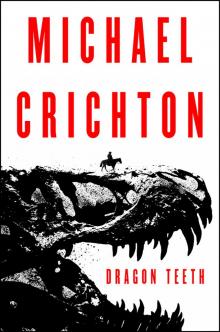 Dragon Teeth
Dragon Teeth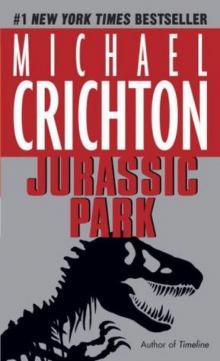 Jurassic Park
Jurassic Park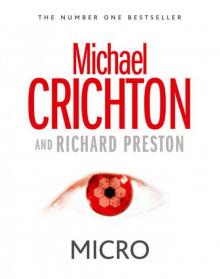 Micro
Micro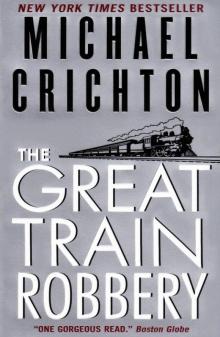 The Great Train Robbery
The Great Train Robbery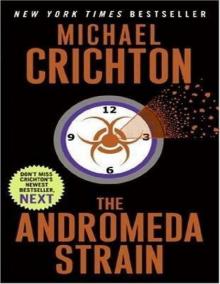 The Andromeda Strain
The Andromeda Strain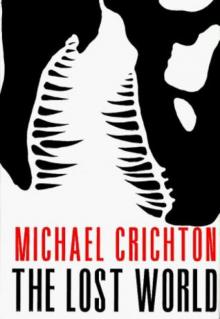 The Lost World
The Lost World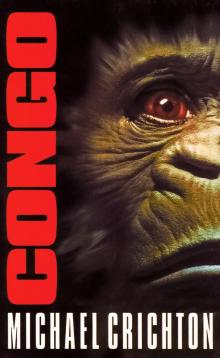 Congo
Congo Travels
Travels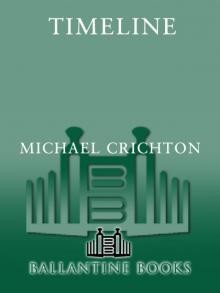 Timeline
Timeline Sphere
Sphere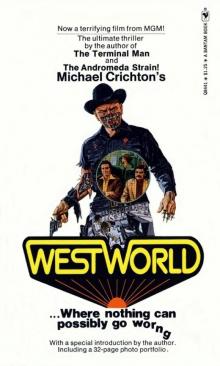 Westworld
Westworld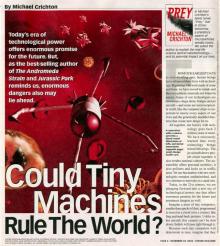 Prey
Prey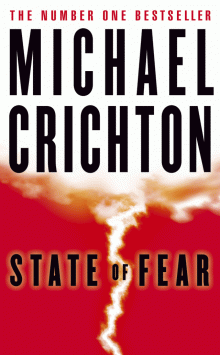 State Of Fear
State Of Fear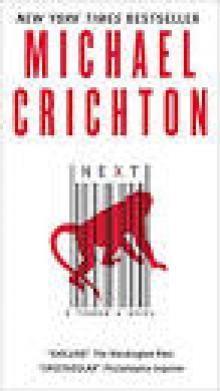 Next
Next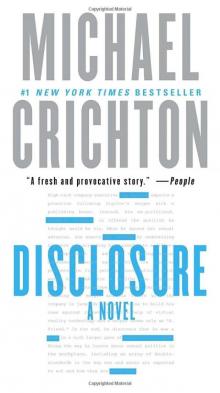 Disclosure
Disclosure Pirate Latitudes
Pirate Latitudes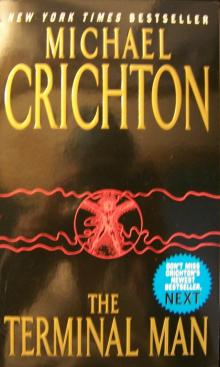 The Terminal Man
The Terminal Man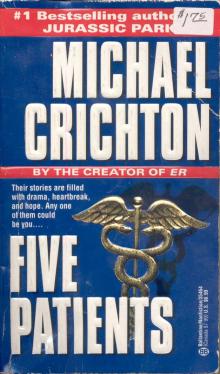 Five Patients
Five Patients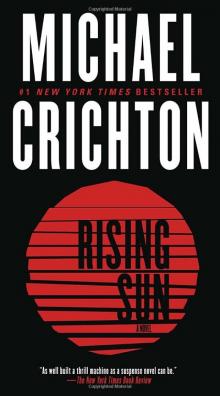 Rising Sun
Rising Sun Binary
Binary The Andromeda Evolution
The Andromeda Evolution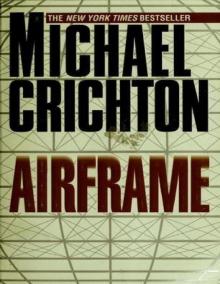 Airframe
Airframe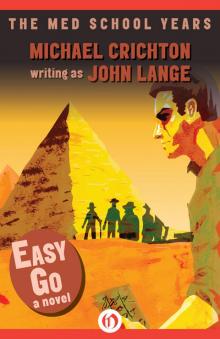 Easy Go
Easy Go Drug of Choice
Drug of Choice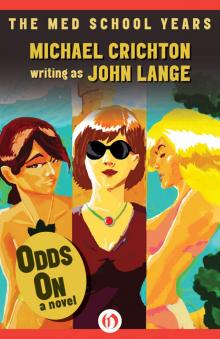 Odds On: A Novel
Odds On: A Novel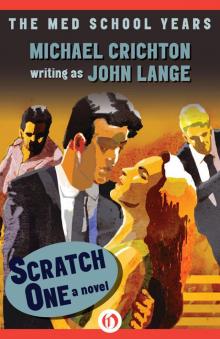 Scratch One
Scratch One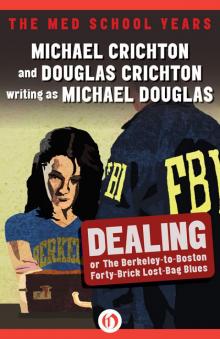 Dealing or The Berkeley-to-Boston Forty-Brick Lost-Bag Blues
Dealing or The Berkeley-to-Boston Forty-Brick Lost-Bag Blues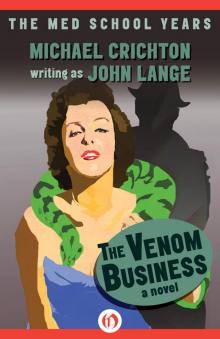 Venom Business
Venom Business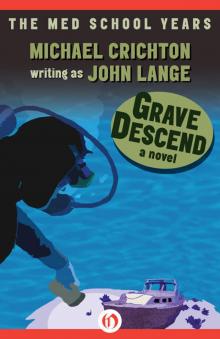 Grave Descend
Grave Descend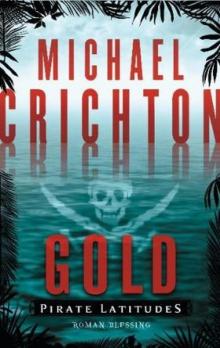 Gold - Pirate Latitudes
Gold - Pirate Latitudes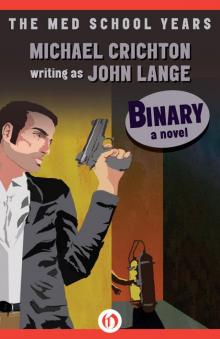 Binary: A Novel
Binary: A Novel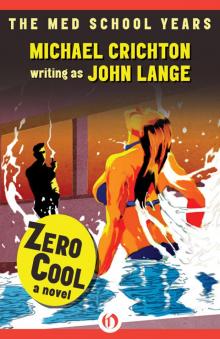 Zero Cool
Zero Cool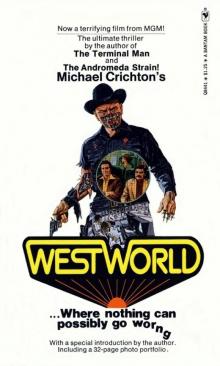 Delos 1 - Westworld
Delos 1 - Westworld